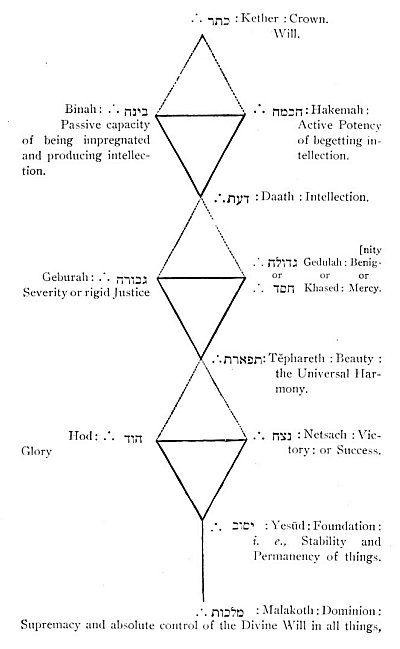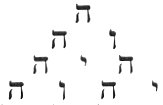God, in the view of Pythagoras, was ONE, a single substance, whose continuous parts extended through all the Universe, without separation, difference, or inequality, like the soul in the human body. He denied the doctrine of the spiritualists, who had severed the Divinity from the Universe, making Him exist apart from the Universe, which thus became no more than a material work, on which acted the Abstract Cause, a God, isolated from it. The Ancient Theology did not so separate God from the Universe. This Eusebius attests, in saying that but a small number of wise men, like Moses, had sought for God or the Cause of all, outside of that ALL; while the Philosophers of Egypt and Phœnicia, real authors of all the old Cosmogonies, had placed the Supreme Cause in the Universe itself, and in its parts, so that, in their view, the world and all its parts are in God.
The World or Universe was thus compared to man: the Principle of Life that moves it, to that which moves man; the Soul of the World to that of man. Therefore Pythagoras called man a microcosm, or little world, as possessing in miniature all the qualities found on a great scale in the Universe; by his reason and intelligence partaking of the Divine Nature: and by his faculty of changing aliments into other substances, of growing, and re-producing himself, partaking of elementary Nature. Thus he made the Universe a great intelligent Being, like man–an immense Deity, having in itself, what man has in himself, movement, life, and intelligence, and besides, a perpetuity of existence, which man has not; and, as having in itself perpetuity of movement and life, therefore the Supreme Cause of all.
Everywhere extended, this Universal Soul does not, in the view of Pythagoras, act everywhere equally nor in the same manner. The highest portion of the Universe, being as it were its head,
p. 668
seemed to him its principal seat, and there was the guiding power of the rest of the world. In the seven concentric spheres is resident an eternal order, fruit of the intelligence, the Universal Soul that moves, by a constant and regular progression, the immortal bodies that form the harmonious system of the heavens.
Manilius says: “I sing the invisible and potent Soul of Nature; that Divine Substance which, everywhere inherent in Heaven, Earth, and the Waters of the Ocean, forms the bond that holds together and makes one all the parts of the vast body of the Universe. It, balancing all Forces, and harmoniously arranging the varied relations of the many members of the world, maintains in it the life and regular movement that agitate it, as a result of the action of the living breath or single spirit that dwells in all its parts, circulates in all the channels of universal nature, flashes with rapidity to all its points, and gives to animated bodies the configurations appropriate to the organization of each . . . . This eternal Law, this Divine Force, that maintains the harmony of the world, makes use of the Celestial Signs to organize and guide the animated creatures that breathe upon the earth; and gives to each of them the character and habits most appropriate. By the action of this Force Heaven rules the condition of the Earth and of its fields cultivated by the husbandman: it gives us or takes from us vegetation and harvests: it makes the great ocean overpass its limits at the flow, and retire within them again at the ebbing, of the tide.”
Thus it is no longer by means of a poetic fiction only that the heavens and the earth become animated and personified, and are deemed living existences, from which other existences proceed. For now they live, with their own life, a life eternal like their bodies, each gifted with a life and perhaps a soul, like those of man, a portion of the universal life and universal soul; and the other bodies that they form, and which they contain in their bosoms, live only through them and with their life, as the embryo lives in the bosom of its mother, in consequence and by means of the life communicated to it, and which the mother ever maintains by the active power of her own life. Such is the universal life of the world, reproduced in all the beings which its superior portion creates in its inferior portion, that is as it were the matrix of the world, or of the beings that the heavens engender in its bosom,

Moe is the founder of GnosticWarrior.com. He is a father, husband, author, martial arts black belt, and an expert in Gnosticism, the occult, and esotericism.






